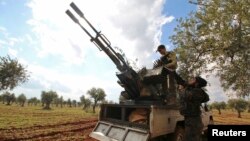U.N. peace envoy Staffan De Mistura’s hopes of pulling off a deal to freeze fighting in Syria’s war-torn city of Aleppo were dashed Sunday when Syrian rebel leaders refused to approve his plan, saying they wouldn’t meet with him in the future.
The rejection by military and political opposition leaders came despite the Syrian government agreeing in principle earlier in the day to an international fact-finding mission visiting Aleppo, once Syria’s commercial hub.
De Mistura was appointed the U.N. peace envoy in the summer.
Aleppo has been devastated by fighting since mid-2012, and the north Syrian city split between loyalist forces and rebels has been at the center of some of the fiercest fighting of the four-year civil war.
Shelling, barrel-bomb accusations
Rebel leaders and rights groups have accused Syrian government forces of indiscriminate shelling and dropping so-called barrels bombs -- containers packed with explosives and hurled out of government helicopters.
Last week, De Mistura appeared confident he might succeed with his incremental peace approach based on the idea of getting the warring parties to agree local freezes across contested towns and cities as the first steps toward a wider cessation of hostilities.
Before arriving in the Syrian capital at the weekend he told reporters, "The government of Syria has indicated to me its willingness to halt all aerial bombing and artillery shelling for a period of six weeks all over the city of Aleppo from a date we’ll announce from Damascus."
And according to Syria’s state news agency, Foreign Minister Walid al-Moallem had agreed a fact-finding team could head to Aleppo to work out a trial zone for the truce. The agency didn’t report on whether any timetable had been agreed.
Rebels claim the move is just a propaganda ploy. They said Syrian President Bashar al-Assad would only have agreed to a trial cease-fire in a neighborhood he didn’t control.
'Refuse to meet'
"We refuse to meet with De Mistura, if it is not on the basis of a comprehensive solution to Syria's drama through the exit of Bashar al-Assad and his chief of staff, and the prosecution of war criminals," Aleppo's revolutionary council said in a statement.
The revolutionary council made up of leaders from a variety of Western-backed rebel brigades was formed Saturday at a meeting in the southern Turkish border town of Kilis that was attended by the main opposition political leaders, including Khaled Khoja, the exiled president of the U.S.-favored Syrian National Coalition.
In its statement rejecting De Mistura's freeze proposal, the revolutionary council said it "falls short of an initiative to resolve the humanitarian crisis of our people targeted by the regime's use of chemical weapons and barrel bombs prohibited by the international community.”
Council members said they couldn’t agree to a freeze in the fighting in Aleppo while other Syrian towns remain fighting.
"Syria and its people are one and indivisible. The blood of our brothers in Daraa (in the south), in Ghouta (near Damascus), in Homs (central) and in other Syrian provinces are no less important than our blood in Aleppo," they said.
Major setback
The rejection represents a major setback for the Swedish-Italian diplomat, who had made the freeze plan the centerpiece of his diplomatic efforts to end the war.
But in an emailed note to reporters, one of his aides said the envoy, who prompted rebel anger last month when he described Assad as "part of the solution" to the conflict, intends to persevere.
He had hoped that with rise of the so-called Islamic State militant group, he might have the wiggle room to persuade the rebels and the government to agree a temporary end to their conflict, so the two could face the common threat of the jihadists.
The U.N. envoy argued the Islamic State group represented a new factor that could coax the warring sides to look at their conflict in a different light and recognize the jihadists have exploited the civil war and are the real enemy.
For the Assad regime, a freeze would have the twin dangers of accepting a status quo on the ground and give the rebels some legitimacy, according to analysts.
For Syrian rebels, the U.N. envoy’s approach never got much traction.
Flawed plan
They have argued for weeks a freeze plan is fundamentally flawed.
When it was first mooted by Mistura, Hadi al-Bahra, then-president of the Syrian National Coalition, dismissed the idea. “Assad’s brutality and repression has been an incubator for extremism,” he said.
“Cease-fires and limiting existing violence provide a temporary solution, but not a permanent resolution of the crisis. Cease-fires without a clear vision for a full and comprehensive political solution will give the regime time to regroup and reorganize itself to continue its crimes against the Syrian people at a later stage,” he added.
Rebel antipathy to a cease-fire only deepened.
Infuriated by Washington’s focus on the Islamic State group, Syrian rebels have feared the West is ready to sign off on a behind-the-scenes bargain with Assad, one permitting him to remain in power.




